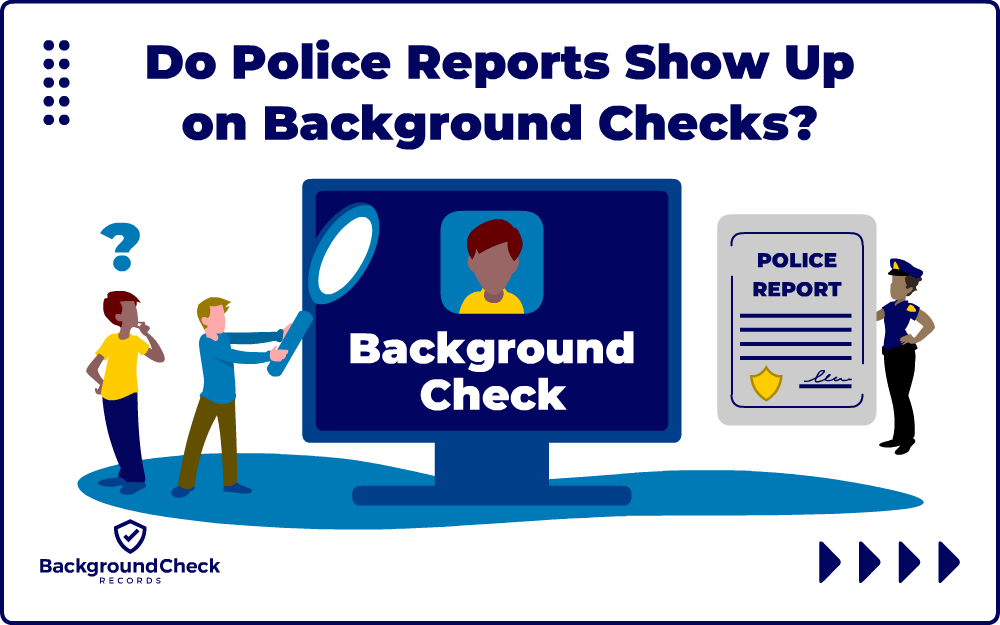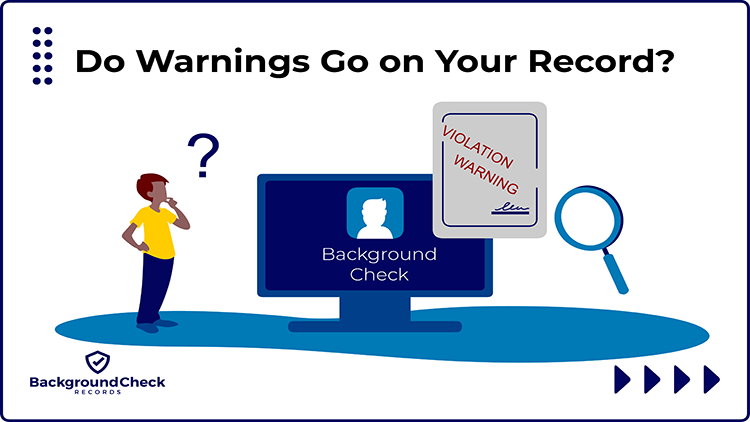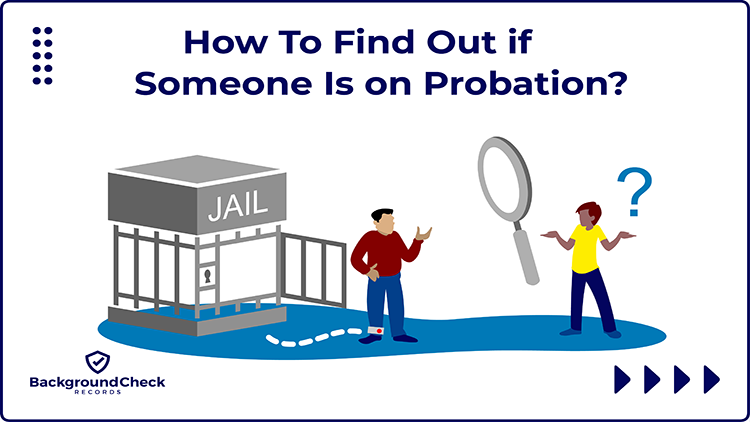Do Police Reports Show Up on Background Checks? (See Your Record)
Whether police reports appear on background checks depends on the depth and type of check conducted, so there is no simple yes or no answer.
So to see your record, perform a search now using the form below, or sift through countless law enforcement agencies and request the report in hopes they provide it.
Do Background Checks Show Police Reports? Do Police Reports Go on Your Record?
When trying to determine if you’ve been charged with a crime, it’s important to consider that a police report cannot be termed a criminal record unless it leads to court proceedings and the subject is found guilty of the crime committed. And while it may go “on your record”, it’s not necessarily on your criminal record.
But depending on how the police report is filed or which databases are used, a police report may return on a background check report. So while information from background checks and police reports may overlap, they are not quite the same because a police report will contain information about an illegal or possibly illegal offense.
A police officer will mention the sort of crime committed, such as theft, burglary, or misdemeanor, as well as the location and method of reporting.
The report may indicate arrest records, crime patterns, driving records, criminal cases, sex offenders, motor vehicle events, and any other information. They may state the time and date of the report, the occurrence, and whether or not anyone was injured.
What Types of Background Checks Reveal Police Reports?
When considering whether police reports appear on background checks, it depends on the type of background screening being conducted. There are several types of background checks that one can run to learn about their past or their subjects. Police reports might show up in some and not in others.
Let’s look at some of these background checks and see if they reveal an individual’s police reports.
- Criminal background checks: Police reports might or might not appear in a criminal history search. If the check is extensive, some police reports might show up, or if the incident led to arrests and court proceedings. Those incidents that didn’t result in further investigations, arrests, or lawsuits are unlikely to reveal police reports.
- Employment background checks: The main aim of running pre-employment is to get criminal history and past work information. So, if the subjects mentioned in the police reports were not presented in court, the check would not reveal the police reports.
- Level 1 background checks: These are name-based checks run within the state. In this category of background checks, police records may be revealed if individuals have been found guilty or if additional investigations were conducted, though the search is not exhaustive.
- Level 2 background checks: These are fingerprint-based checks that may go beyond the state to the national level. These checks may reveal police reports if the subject was arrested and convicted.
How Do I Find Out if a Police Report Was Filed Against Me?
It can be hard to know whether an individual has a police report filed against them. However, knowing where the reports are stored can be a stepping stone to getting the report details.
The reports are stored in the records bureau of the law enforcement departments (police, sheriffs, highways patrol, etc.). Individuals can access their police records or lack thereof by calling their local or regional police departments.
Citizens have the right to get their police reports in order to understand what they are accused of. If they have been charged, they can request a copy of the police report from the District Attorney’s office.
These reports include information such as the names of all parties involved, the location and date of the incident, and an incident description.
The FOIA permits the COPS Office to release police reports to anybody who seeks them in writing and contains a reasonable explanation of the circumstances of the information being requested. Certain details may be exempted from disclosure under the Freedom of Information Act.1
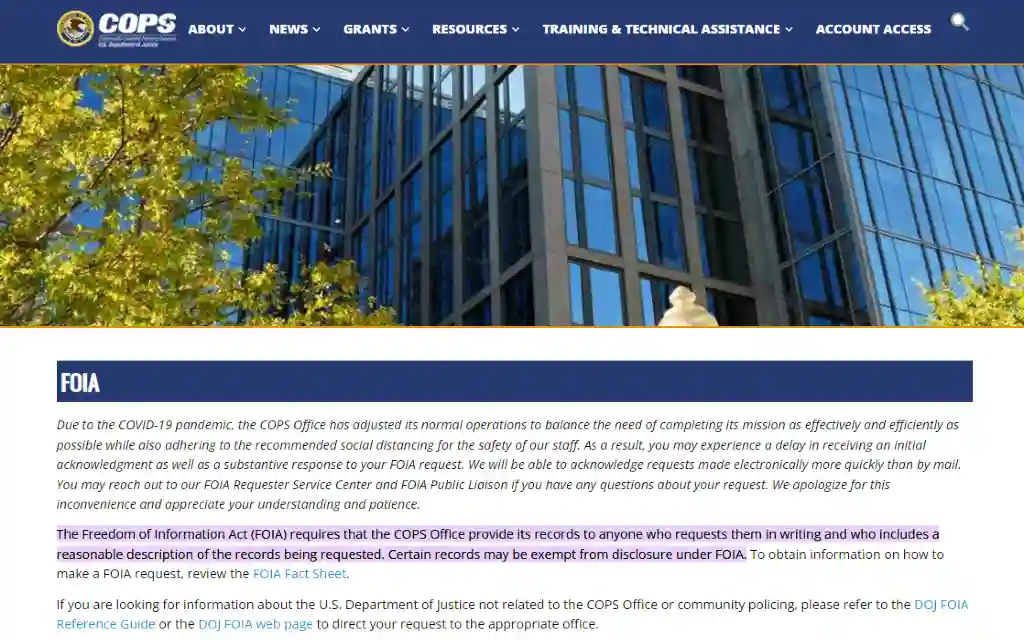
The cost of getting the police report varies from one state to another. For example, in Derry, New Hampshire, each police report costs $10 per copy for the first 10 pages and $1 for each extra page.
There is an additional fee if photographs were taken at the scene; these aren’t included in the cost of each report and should be obtained separately. Any duplication of videotapes or audio will be charged $25, irrespective of the nature of the tape.2
Again, the process of obtaining or contacting the police or sheriff’s department varies. Individuals can call or visit in person in Derry, New Hampshire.
It is good to note that if the charges in the police report are under investigation or if the case is ongoing, police may avoid issuing any details concerning the parties involved or any other details that may interfere with the ongoing investigations.
This is especially useful if they’re searching for a job or are pending a leasing application while wondering the timeline of apartment background checks. It’s also useful in cases where the cops need to reach them immediately.
Furthermore, if one has ever been investigated or arrested, there must probably be a police report filed against them. To get their police reports, they can go to the police department and ask why they were arrested or investigated.
Suggested Reading: How To Find Out if Criminal Charges Are Filed
Alternatively, one can use third-party background check websites. Through the right method, such websites provide the most extensive background checks. The data generated is clear and straightforward, allowing citizens to understand what is being revealed about their past.
Do Pending Investigations Show Up on a Background Check?
The answer to whether pending charges appear on a background check is “yes.” A criminal history check can show misdemeanors, felonies, pending criminal proceedings, and incarceration history.
Nonetheless, several states place limitations on the reporting or utilization of pending charges.
In Delaware, for example, pending felonies show on a criminal record check, but unresolved misdemeanors do not.3
Is a Police Report the Same Thing as an Incident Report?
When asking yourself whether police reports show up on background checks, keep in mind that the key difference between a police report and an incident report is that a law enforcement officer notes down a police report, but an incident report is written from the victim’s account perspective.
A police report will contain information about a potentially illegal offense. A police officer or sheriff will mention the sort of crime allegedly committed, like a misdemeanor, burglary, or robbery, as well as the location and method of reporting.
Incident reports, unlike police reports, are not always focused on crimes. They instead contain information about various scenarios, public safety concerns, suspects, or complaints.
Police Report vs. Incident Report
They are frequently used interchangeably, although in general, an incident report refers to a call in which no crime was committed (lost child, traffic accident, noisy neighbor, suspicious individuals, etc.), and a police report refers to a call in which a crime was committed and “police action” was taken (arrest, investigation, etc.).
Below is a comparison between an incident report and a police report.
| Police Report |
Incident report |
| Written by a law enforcement officer |
It’s an account of the alleged victim |
| May lead to an arrest prior to the investigation |
May not lead to arrests, especially for minor cases |
| Mostly the reports are about criminal offenses |
The reports are mostly about non-criminal offenses like an accident at a construction site or calls to police (use under incident report) |
| Written by an officer |
Written by a dispatcher or PSO |
Do Incident Reports Show Up On Your Criminal Record?
An incident report is not proof of guilt to any public member; hence it won’t necessarily appear on the criminal record unless with certain exceptions where the report led to court proceedings or conviction.
Such incidents may include noisy neighbors, strange individuals, etc. which may not necessarily attract any charges.
If it is nothing more than someone complaining about what someone did or didn’t do, it does not appear on the criminal record until they are punished in court or have a civil order issued against an individual.
The report is entered onto a computer and saved. The agency that received the information will save its name on the computers for local reference, but it will not be made public.
However, individuals can request incident reports from the police departments if they were mentioned in the reports.
How To See if a Police Report Will Come Up On a Background Check (Check Your Record)
It is a good idea for individuals to conduct background checks using various methods stipulated in state or federal laws to see if the police report will appear in a background check.
There are different state agencies that handle background checks, but most of them are under the department of public safety.
Members of the public may also use third-party sites to run background checks. They give extensive checks drawn from various databases.
Individuals may contact their respective Department of Public Safety (DPS) or county police, or sheriff departments to check their records. In many instances, the states or counties have an online portal where individuals can fill in details and send fingerprints via mail for the background check process.
Each state or county has a cost associated with background checks. But in all, very few counties accept cash payments. Individuals may check their records in person, via mail, through online portals, or by calling the DPS for further directions.
In Clayton County, Georgia, for example, the police department allows individuals to request their background check in person. Requesters must show a valid government-issued photo ID and social security card, and fill out and sign a waiver form.
If the search requires fingerprints, individuals must cater to the cost that comes with it. Individuals must pay $20 to acquire their personal criminal history information. It can be paid with a money order, in cash, or with a cashier’s check made payable to the Clayton County Police Department.4
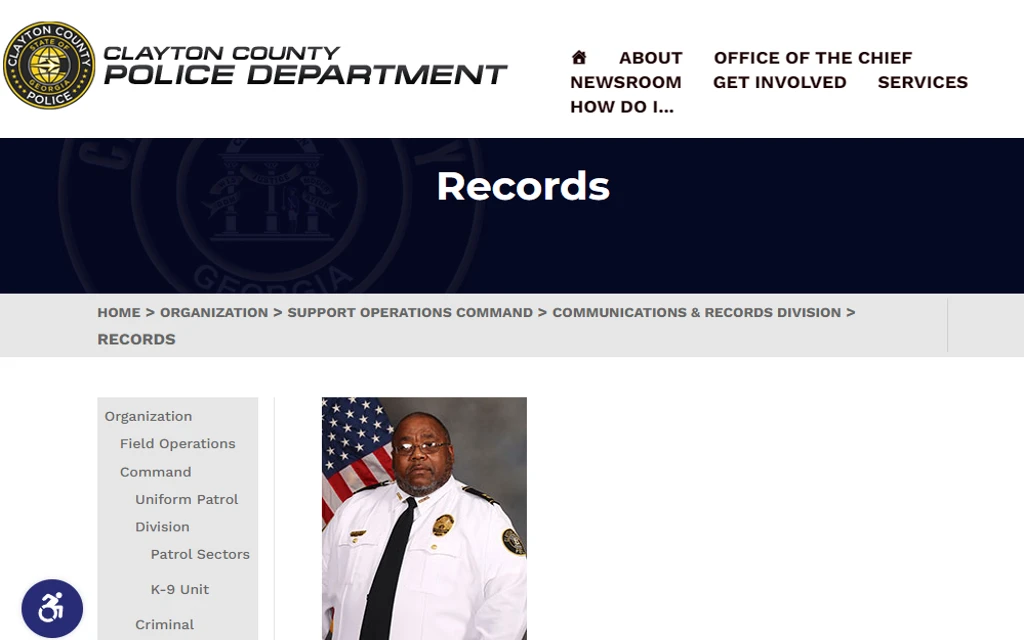
How Long Until Police Reports Fall Off of Criminal Background Checks
Knowing how long police reports are kept is close to impossible because each report stays depending on the weight of the alleged crime, age, and what follows after the report.
Therefore, police records may appear on background checks, and there is no specific timeframe for them to be removed from criminal records. What actually occurs is that the statute of limitations for the offense listed in the report expires, rendering it worthless after a certain time.
Do Police Reports Go Away?
That is determined by state legislation if any exists. Many departments discard minor incident reports after one or two years.
More serious evidence is preserved until the state statute of limitations for the offense has expired, although if the accused has been convicted, it can be released sooner.5
What Else Shows Up on a Background Check?
There is different information that shows up on a background check. For instance, level 1 background checks and level 2 background checks will show different levels of criminal history. Generally, a background check shows the following details:
- Criminal records: Perhaps this is the main aspect of any background check. Criminal records will show arrests, court records, sex offenses, incarceration records, convictions of felonies and misdemeanors, and warrants. However, in some states, like California, some criminal records that have stayed on record for over 7 years won’t show up in a background check.
- Personal information: Personal information such as their address, name, aliases, previous addresses, and marital status will be included in the background screening.
- Employment history: Employers can use background checks to ensure that all of the individual’s employment history is correct, including where they have previously worked, what position they held, and what compensation they may have received.
- Sex offender records: Every state in the United States must have a public sex offenders’ registry. A national sex offender registry, which incorporates all state, tribal, and territorial registries, is also available. Sex offenses will be revealed in a free criminal background check, paid ones, and on the sex offender registery.6
- Credit report: A citizen’s credit record is the only thing an employer can look at if they grant them written authorization. Employers do not have access to your credit score. However, they do have access to bankruptcy, accounts that have been placed for collection, and information on loans. Employers cannot discover bankruptcies or accounts slated for collection after ten years under FCRA laws. Police reports do not appear on background checks here, as these involve civil matters where crime reports do not surface.
- Driving records: Each state in the United States has laws concerning driving records. They all allow individuals, businesses, and other entities to access driving records that are on record for a specific time period. For example, some allow up to 7 years, while others may allow up to 3 years.
It’s good to note that the above are not the only records that will show up in a background check. Other records may include SNN authentication, military records, drug test records, workers’ compensation records, character references, or school records.
With the information we provided in this guide, we aim to clarify whether police reports appear on background checks. A police record is unlikely to be revealed if the investigation is not extensive.
Frequently Asked Questions
Do DUIs Show Up On A Background Check?
DUI means driving under the influence, and it’s a criminal crime that will be recorded on a criminal history check. A DUI conviction is likely to appear in a pre-employment background screening that includes an MVR or driving record check.
Do Arrest Records Appear On A Background Check?
Arrests that did not result in convictions might appear on some criminal background checks if the case was filed within the last seven years, as permitted by federal and state law.
Are Restraining Orders Shown in Police Reports?
Temporary restraining (protection) orders are indeed visible to law enforcement officers. A permanent protection order hearing is held after a protection order is imposed. The restraining order might be denied at that hearing, which implies that it must be expunged from the individual’s police record.
However, if the hearing ends in a permanent order, it will be recorded on their record. Even protection orders that must be lifted can remain in the system for a long time. In this scenario, citizens must cooperate with their legal representation to properly expunge the record.
Is it Possible to Lose Security Clearance Due to a Misdemeanor?
Like almost all other variables considered in security clearance applications, a misdemeanor may or may not affect an individual’s security clearance request.
Any offense involving firearms, alcohol, drugs, or sexual activity is taken very seriously by the federal govt. A related misdemeanor may disqualify anyone.
The further back the misdemeanor happened, the less it will likely affect their application. In fact, if the misdemeanor took place more than ten years ago, they may not even need to declare it on their application.
Are Sealed or Expunged Records Revealed On Background Check Reports?
When a judge expunges a trial or sentence record, the public has no access to it, and the defendant has the right not to reveal the case when queried about their criminal past.
Many background checks do not allow for the revelation of sealed cases.
Suppose there is a large time lag between the conclusion of a lawsuit and the determination to expunge it. In that case, the data may remain visible in criminal-background public databases until the records are changed to show up in the expungement.
Do Police Reports Show Up On FBI Background Checks?
An FBI background check will rarely show police reports. An FBI check includes a report of a federal public felony and misdemeanor convictions. Basic information concerning the conviction, charge, and any resulting one being detained may be included in the check.
1 (n.d.). YouTube. Retrieved July 18, 2022, from <https://cops.usdoj.gov/pdf/FOIA_Fact_Sheet_v5.pdf>
2 How are police reports obtained, and how much do they cost? | Town of Derry NH. (n.d.). Town of Derry NH |. Retrieved July 18, 2022, from <https://www.derrynh.org/police-department/faq/how-are-police-reports-obtained-and-how-much-do-they-cost>
3 “Delaware Code Online.” Delaware Code Online, <https://delcode.delaware.gov/title11/c002/index.html. Accessed 22 July 2022.>
4 Clayton County, Georgia Police Department Official Website. (n.d.). Clayton County, Georgia Police Department Official Website. Retrieved July 18, 2022, from <https://www.claytonpolice.com/organization/support-operations-command/communications-records-division/records/>
5 Criminal Statutes of Limitations. (n.d.). Minnesota House of Representatives. Retrieved July 18, 2022, from <https://www.house.leg.state.mn.us/hrd/pubs/statlmt.pdf>
6 (n.d.). YouTube. Retrieved July 18, 2022, from <https://www.nsopw.gov/Error?aspxerrorpath=/en/Registry>

